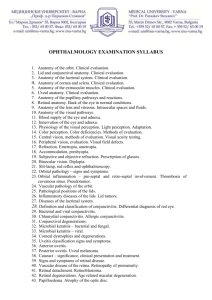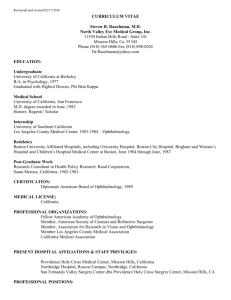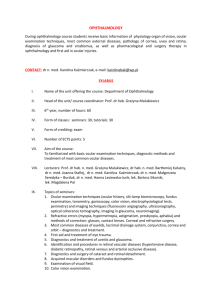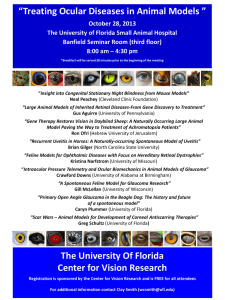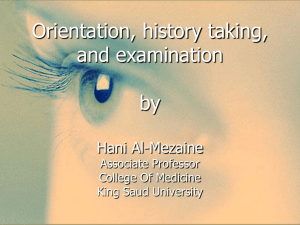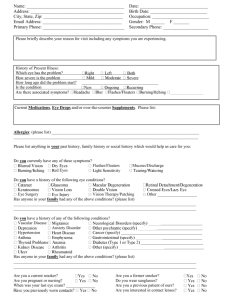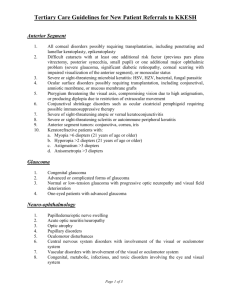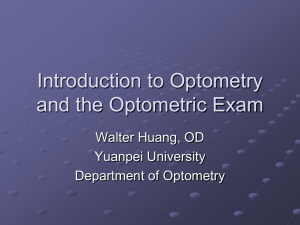Sylabus
advertisement
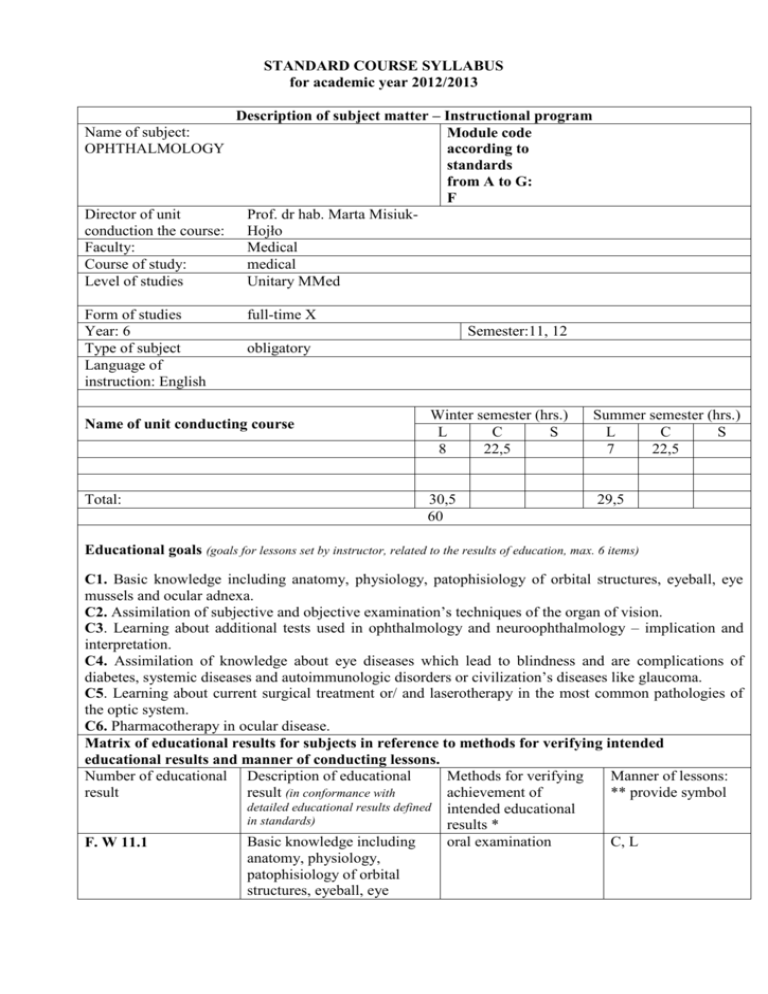
STANDARD COURSE SYLLABUS for academic year 2012/2013 Description of subject matter – Instructional program Module code according to standards from A to G: F Director of unit Prof. dr hab. Marta Misiukconduction the course: Hojło Faculty: Medical Course of study: medical Level of studies Unitary MMed Name of subject: OPHTHALMOLOGY Form of studies Year: 6 Type of subject Language of instruction: English full-time X Semester:11, 12 obligatory Name of unit conducting course Total: Winter semester (hrs.) L C S 8 22,5 Summer semester (hrs.) L C S 7 22,5 30,5 60 29,5 Educational goals (goals for lessons set by instructor, related to the results of education, max. 6 items) C1. Basic knowledge including anatomy, physiology, patophisiology of orbital structures, eyeball, eye mussels and ocular adnexa. C2. Assimilation of subjective and objective examination’s techniques of the organ of vision. C3. Learning about additional tests used in ophthalmology and neuroophthalmology – implication and interpretation. C4. Assimilation of knowledge about eye diseases which lead to blindness and are complications of diabetes, systemic diseases and autoimmunologic disorders or civilization’s diseases like glaucoma. C5. Learning about current surgical treatment or/ and laserotherapy in the most common pathologies of the optic system. C6. Pharmacotherapy in ocular disease. Matrix of educational results for subjects in reference to methods for verifying intended educational results and manner of conducting lessons. Number of educational Description of educational Methods for verifying Manner of lessons: result result (in conformance with achievement of ** provide symbol detailed educational results defined intended educational in standards) results * Basic knowledge including oral examination C, L F. W 11.1 anatomy, physiology, patophisiology of orbital structures, eyeball, eye mussels and ocular adnexa F. W 11.2 Assimilation of knowledge oral examination about eye diseases which lead to blindness and are complications of diabetes, systemic diseases and autoimmunologic disorders or civilization’s diseases like glaucoma. C, L F. W 11.3 Learning about current oral examination surgical treatment or/ and laserotherapy in the most common pathologies of the optic system (corneal leucoma, cataract, glaucoma, retinal detachment, proliferative vitreoretinopathies, tumors of the eye and ocular adnexa). C, L F. W 11.4 Pharmacology in ocular oral examination disease. Examination, detection and oral response knowing of therapeutic principals in treatment of ophthalmic diseases and refraction disorders. C, L Practical skills in detection oral response and removal the alien bodies from conjunctival sac (reversion of the upper and lower eyelid). First aid rules in burns and mechanical injuries of the eye and orbit. C F U 19 F U 20 C *e.g.. test, presentation, oral response, essay, report, colloquium, oral examination, written examination; ** L- lecture; S- seminar; C- class; EL- e-learning; Student work input (balance of ECTS points) Lessons on-site (hrs.) 60 Own work (hrs.) 29,7 Summary of student workload 89,7 ECTS points for subject 4,5 Remarks Content of lessons: (please provide the subject of individual lessons, keeping in mind the need to contribute to the intended educational results) 1. 2. 3. 4. 5. 6. Methods of examination of the organ of vision Diseases of eyelid, orbit and lacrimal system Conjuntival, corneal and scleral diseases Uvetis and choroidal tumors Glaucoma Lens diseases 7. Retinal detachment, retinal vassels disorders, retinal degenerations 8. Neurophthalmology and strabismus 9. Refraction disorders 10. Systemic and local therapy in ophthalmology. Primary and secondary literature 1. „Compendium of Ophthalmology.” (Lecture notes on ophthalmology.) Bruce J., Chris C., Bron A., Blackwell Science Limited, Oxford 1999 2. „The physician’s guide to eye care.” Trobe J. D., American Academy of Ophthalmology 2000. 3. „Fundamentals of Ophthalmology.” Reinecke R. D., Farrell T. A., American Academy of Ophthalmology 1998 Requirements concerning instructional aids (e.g. laboratory, multimedia projector, other …) LAPTOP, MULTIMEDIA PROJECTOR Conditions for successful completion of course: Oral examination Name and address of unit conducting course, contact information (tel./email): Katedra i Klinika Okulistyki, ul. Borowska 213, 50-556 Wrocław tel. 71 7364300, klo@aszk.wroc.pl . Person responsible for the course for a given year Dr n. med. Joanna Adamiec-Mroczek Signature of head of unit conducting the course Signature of dean .………....…..… ……….………..…… Date of syllabus drafting: ……………………………………………
